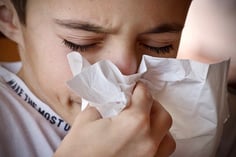[ad_1]
The coronavirus (COVID-19) is currently causing concern around the world. The CDC has declared a Public Health Emergency for the U.S. The situation and number of cases are changing daily. Many have noted the lack of hand soaps, sanitizers, and disinfecting cleansers in stores as people are stocking up. For families of children with Autism, staying germ-free can especially be a concern for children who have not developed proper handwashing skills or hygiene skills, in addition to everyday germs that children encounter at schools, care centers, and other activities.
 The coronavirus is a viral illness, like the seasonal flu. Symptoms are cold-like, including a fever, runny nose, and cough. At present, authorities believe that children may be less susceptible to the virus than other groups of people, but they may be carriers of the virus. While some children with autism may be hypersensitive to cleanliness, many others are less aware of the concerns, so it’s important to educate all children on how they can stay safe by practicing good hygiene:
The coronavirus is a viral illness, like the seasonal flu. Symptoms are cold-like, including a fever, runny nose, and cough. At present, authorities believe that children may be less susceptible to the virus than other groups of people, but they may be carriers of the virus. While some children with autism may be hypersensitive to cleanliness, many others are less aware of the concerns, so it’s important to educate all children on how they can stay safe by practicing good hygiene:
1. Washing Hands
To help prevent coronavirus, the CDC recommends washing hands frequently with hot water and soap for at least 20 seconds. Experts recommend that children sing Happy Birthday through twice to ensure enough time is spent on handwashing. Using an alcohol-based hand sanitizer can work if water is unavailable.
Washing hands independently is an important self-care skill. To encourage children to wash hands, the sink area should be accessible with soap and hand towels available.
The LB4 Language Builder: Sequencing Card Set offers a visual prompt and routine for children to use soap, water, then dry their hands. Prompting, such as, “Wash hands,” may be help depending on the child’s independence level.
I addition the “Healthy Habits Puzzle” is a fun activity children can do that will help keep their hands busy and help them visualize the act of hand washing. The puzzle is made of solid wood cubes that offer six pictures of kids participating in healthy daily habits, including washing hands!
2. Healthy Habits
The CDC recommends that people try not to touch their eyes, nose, or mouth. This can be difficult for any child, but especially children with autism who may seek stimulation using these parts of their face, and frequently touch them. Making sure that children frequently wash their hands is important. Offering toys or fidget objects is a strategy parents can use to keep their child’s hands away from the face area.
3. Keeping Spaces Clean
The CDC recommends using a household disinfecting wipe or spray to clean common areas that are frequently touched in a household. Areas such as doorknobs, light switches, refrigerator handles, desks, computers, and phones, are touched many times throughout the day and important to keep clean. Other precautions you can take in the home include lining trash cans with plastic and washing laundry and bedding frequently at the highest possible temperature.
4. Talking to Children About the Coronavirus COVID-19
Talk about the coronavirus is all over the media. There is a general sense of panic in the media, which may cause children to feel anxious. It is important to provide children with accurate, factual information at an appropriate level. Children can be taught about being sick using videos, images, social stories, or talking about past times people were sick. To ease any stress children may feel, it is important to communicate ways they can stay protected (washing hands, toys, and areas in the house) and to help them practice these healthy habits. The conversations about Coronavirus should be kept light, focusing mostly on ways children can stay healthy, so children do not become scared. Additional supports outside of the home can help children feel at ease. For example, communicating with school personnel and other caregivers to keep a positive attitude about staying healthy and staying away from discussions of how the Coronavirus is spreading will help maintain your child’s sense of safety.
5. Preparing if your child feels sick…
Coronavirus cases have varied in severity, but common symptoms include a fever over 100.4°, a cough, runny nose, sore throat, and difficulty breathing. Officials recommended staying at home if you or anyone in your home feel sick and contact a health care provider as soon as possible.
It can be stressful to have to quarantine if jobs, schools, and care centers in your community close unexpectedly. In the case that you or your child becomes sick, it is important to prepare a plan. This plan may include other sleeping arrangements, childcare backup, and stocking up on daily products and food. Keeping neighbors, other family members, and friends aware of any emergency plans will ensure support if the time comes.
This article is based on the following research:
https://www.cdc.gov/coronavirus/2019-ncov/summary.html
https://www.cdc.gov/coronavirus/2019-ncov/specific-groups/children-faq.html
